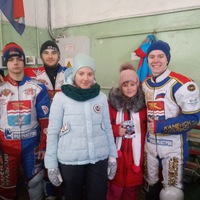
Как после войны восстановить испорченные войной отношения между народами/нациями?
 0
0
 0
0
Ответы на вопрос
 Внимание! Ответы на вопросы дают живые люди. Они могут содержать ошибочную информацию, заблуждения, а также ответы могут быть сгенерированы нейросетями. Будьте внимательны. Если вы уверены, что ответ неверный, нажмите кнопку "Пожаловаться" под ответом.
Внимание! Ответы на вопросы дают живые люди. Они могут содержать ошибочную информацию, заблуждения, а также ответы могут быть сгенерированы нейросетями. Будьте внимательны. Если вы уверены, что ответ неверный, нажмите кнопку "Пожаловаться" под ответом.

Ответ:
Объяснение:
Я думаю что ето практический невозможно.Почему?Потому что если нападает как Россия на Украину то тут никакого доверия небудет.Ну если например другая соседняя страна подталкивает своего соседа напасть на другого то тут уже можно посмотреть под другим углом если война розвязалась и закончилась и узнали кто инициатор то страни воюющие могут примириться но шансы малы и одновременно относиться враждебно к инициатору.В каждом случае по разному.Смотя какие люди у власти.
 0
0
 0
0

Объяснение:
1. Мировое сообщество после Второй мировой войны. Создание ООН
2. Послевоенное мирное урегулирование
3. Формирование двухполюсного мира. Начало холодной войны
3.1. Идеологические разногласия
3.2. План Маршалла и разделение Европы
3.3. Берлинский кризис и раскол Германии
3.4. Гонка вооружений и создание военно-политических блоков
 0
0
 0
0

How to Restore War-Damaged Relations Between Peoples/Nations?
Restoring war-damaged relations between peoples or nations is a complex and challenging process that requires time, effort, and a commitment to reconciliation. Here are some steps that can be taken to facilitate the restoration of these relationships:
1. Acknowledge the past: It is important to acknowledge the historical events and the pain and suffering caused by the war. This includes recognizing the atrocities committed, the loss of lives, and the impact on individuals and communities. Acknowledgment helps create a foundation for understanding and empathy.
2. Promote dialogue and communication: Open and honest dialogue is crucial for rebuilding trust and understanding. Encouraging people from different sides to engage in conversations, share their experiences, and listen to each other's perspectives can help bridge the gaps and foster empathy.
3. Foster reconciliation: Reconciliation involves addressing the grievances and grievances of all parties involved. This can be achieved through various means, such as truth and reconciliation commissions, memorialization efforts, and reparations for victims. These initiatives aim to promote healing, justice, and a sense of closure.
4. Encourage cultural exchange and cooperation: Promoting cultural exchange programs, educational initiatives, and joint projects can help foster understanding and build connections between different communities. By highlighting shared values, traditions, and aspirations, these activities can contribute to the restoration of relationships.
5. Promote economic cooperation: Economic cooperation and trade can play a significant role in rebuilding war-damaged relationships. By fostering economic interdependence, nations can develop mutual interests and incentives for peaceful coexistence. Economic cooperation can also contribute to the development and stability of war-torn regions.
6. Support grassroots initiatives: Grassroots initiatives, such as community-based organizations, peacebuilding programs, and reconciliation projects, can have a significant impact on restoring relationships between peoples and nations. These initiatives often involve local communities and individuals who are directly affected by the war, and they can contribute to long-term peacebuilding efforts.
7. Engage in diplomacy and international cooperation: Diplomatic efforts and international cooperation are essential for resolving conflicts and restoring war-damaged relationships. Engaging in diplomatic negotiations, participating in peace processes, and seeking support from international organizations can provide a framework for addressing the underlying causes of the conflict and promoting reconciliation.
It is important to note that the process of restoring war-damaged relationships is complex and may vary depending on the specific context and history of the conflict. It requires a long-term commitment from all parties involved and a willingness to address the root causes of the conflict.
 0
0
 0
0
Похожие вопросы

Топ вопросов за вчера в категории Литература
Последние заданные вопросы в категории Литература
-
Математика
-
Литература
-
Алгебра
-
Русский язык
-
Геометрия
-
Английский язык
-
Химия
-
Физика
-
Биология
-
Другие предметы
-
История
-
Обществознание
-
Окружающий мир
-
География
-
Українська мова
-
Информатика
-
Українська література
-
Қазақ тiлi
-
Экономика
-
Музыка
-
Право
-
Беларуская мова
-
Французский язык
-
Немецкий язык
-
МХК
-
ОБЖ
-
Психология
-
Физкультура и спорт
-
Астрономия
-
Кыргыз тили
-
Оʻzbek tili























